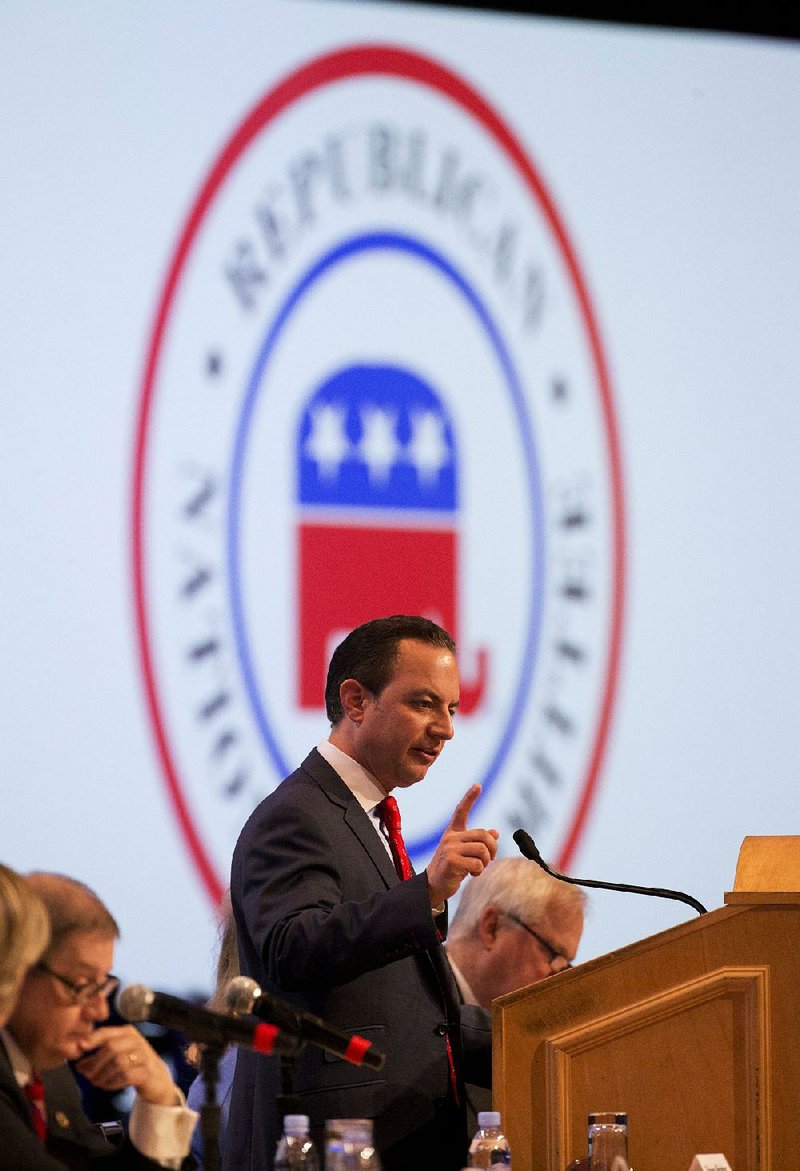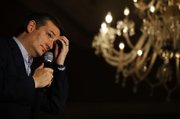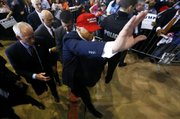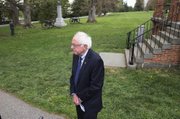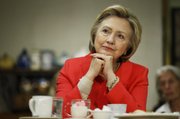HOLLYWOOD, Fla. -- The Republican Party won't "hand the nomination" to any presidential candidate who fails to win a majority of delegates in the coming weeks, the head of the GOP said Friday.
FULL ELECTION COVERAGE
In a speech Friday to Republican National Committee members in Florida, Chairman Reince Priebus said it doesn't matter how close a candidate comes if he doesn't claim the necessary 1,237 delegates. Front-runner Donald Trump has said he should be the nominee as long as he has the most delegates after the state-by-state primary process ends.
"If we don't abide by the majority, we don't honor one of the bedrock values of American government," Priebus said. "Majority rule is as American as apple pie or Opening Day."
Priebus said that without a clear majority, the party will pick its nominee at a contested convention, which will be held in July in Cleveland.
In another remark that seemed aimed at Trump, Priebus called for his party, including the current crop of contenders, to rally behind the eventual nominee. Trump at different times has declined to rule out a third-party candidacy, should his bid for the Republican nomination fall short.
"No one is forcing them to wear our jersey," Priebus said of the Republican contenders. "We expect our candidates to support our party and our eventual nominee."
Paul Manafort, who is leading Trump's primary election strategy, insisted that Trump is prepared to work closely with party leaders, despite the candidate's near-daily public attacks on what he calls "a rigged" presidential nomination system.
"Is Donald Trump running against the Republican National Committee? The answer is he is not," Manafort said.
Manafort has promised anxious Republicans that voters will see "a real different way" soon after the GOP front-runner claims his party's presidential nomination.
"You'll start to see more depth of the person, the real person. You'll see a real different way," Manafort said Thursday
The message is part of the campaign's intensifying effort to convince party leaders that Trump will help deliver big electoral gains this fall, despite his contentious ways. Yet it also opens him up to questions about his authenticity.
Republican rival Ted Cruz seized on the remarks in a radio interview late Thursday.
"I'm actually going to give Trump a little bit of credit here. He's being candid. He's telling us he's lying to us," Cruz told host Mark Levin. "You look at what his campaign manager says, is that this is just an act. This is just a show."
The U.S. senator from Texas continued: "When Donald talks about building a wall, when Donald talks about enforcing immigration laws, when Donald talks about, I guess, anything, that it's all an act, a show."
The Republican National Committee gathered at a seaside resort in south Florida for its annual spring meeting. While candidates in both parties targeted primary contests in the Northeast, Hollywood's Diplomat Resort & Spa turned into a palm-treed political battleground.
Senior advisers for Trump, Cruz and Ohio Gov. John Kasich courted RNC members in a series of private meetings on the resort's grounds, sometimes sitting at adjacent tables in the marble-floored lobby. Trump's tightening grasp of his party's presidential nomination dominated much of the hallway discussion.
"He's trying to moderate. He's getting better," said Ben Carson, a Trump ally who was part of the GOP's front-runner's RNC outreach team.
Trump's team also signaled to RNC members that he was willing to dip into his personal fortune to fund his presidential bid, in addition to helping the national committee raise money, a promise that came as Trump prepared to launch his first big television advertising campaign in a month.
"He's willing to spend what is necessary to finish this out. That's a big statement from him," Manafort said in the briefing.
Trump is increasingly optimistic about his chances in five states holding primary contests Tuesday: Rhode Island, Connecticut, Pennsylvania, Delaware and Maryland. He is now the only candidate for whom it is mathematically possible to collect the 1,237-delegate majority needed to claim the GOP nomination before the party's July convention.
Kasich, campaigning in Connecticut, said he's seeing signs that some primary voters in states that have already voted may be having second thoughts about supporting Trump. Kasich cited new polling that he said shows more New Hampshire primary voters now support him than Trump, who won there in February.
He also urged more than 1,000 people at a high school gymnasium in Glastonbury, Conn., on Friday to help him win some delegates Tuesday so he can have greater standing at the national convention.
Cruz and Kasich hope Trump will fall short so that they can have a chance to turn enough delegates to win the nomination at the convention.
Cruz in Indiana
Cruz put the effort to force a contested convention on full display in Indiana, which votes May 3. Cruz and groups opposing Trump say they plan to make a stand to keep as many of the Hoosier State's 57 delegates away from Trump.
Cruz had the stage to himself Thursday at the Indiana Republican Party's spring dinner, promising to campaign hard for the state.
"The state of Indiana is going to play a pivotal role in this election," Cruz said during the dinner in Indianapolis, where all the presidential candidates were invited to speak, but only he attended. "Indiana's voice, Indiana's megaphone to the country, will decide which path this party goes down, which path this country goes down."
Cruz said that only he and Trump have a viable path to the nomination. He and groups opposed to Trump are trying to replicate their success in Wisconsin's primary, held April 5, with a win in Indiana, a conservative state where Republicans dominate government and only two Democrats have won presidential races since 1936.
Indiana Gov. Mike Pence, a Republican, met privately with Trump on Wednesday and Cruz on Thursday and plans to meet with Kasich next week. He said he expects a competitive race and hasn't ruled out an endorsement.
"I'm just absolutely committed to supporting the Republican nominee for president," Pence said in an interview before the dinner. "I need a partner in the White House."
Edward Adams of Indianapolis, a 53-year-old information technology consultant, said he'll be one of those voters casting a ballot for Cruz as a way to block Trump.
"It would be a complete disaster for the Republican Party," Adams said of a Trump nomination. "It's everything that I have fought against as a Republican all my life."
Sanders watching
On the other side of the ticket, Democratic presidential hopeful Bernie Sanders said in an interview broadcast Friday that he would wait to see what Hillary Clinton includes in her platform before deciding how actively to campaign for her in the fall if she is the party's nominee.
The U.S. senator from Vermont, who has vowed to stay in the race until the Democratic convention, was asked by Andrea Mitchell on her MSNBC show whether he would try to persuade his young followers to back Clinton in the same fashion that she supported President Barack Obama after losing the nomination to him in 2008.
"Well, first of all, I've got to find out what her platform is, what the views are that she is going to be bringing forth, to what degree she will adopt many of the ideas that I think are extremely popular and I think very sensible," Sanders told Mitchell.
He described the process as "a two-way street."
"I want to see the Democratic Party have the courage to stand up to big-money interests in a way that they have not in the past, take on the drug companies, take on Wall Street, take on the fossil-fuel industry, and I want to see them come up with ideas that really do excite working families and young people in this country," he said.
Sanders's comments came during an interview Thursday, parts of which were aired on NBC's Nightly News. Other segments were shown Friday.
Campaigning Friday, Sanders appeared to soften his pointed critiques of Clinton's record as some Democrats urge the party to coalesce around the former secretary of state.
Sanders largely gave Clinton a pass at a town hall meeting in Gettysburg on Friday, except by implication, but later devoted a section of his speech at Millersville University on Friday night to their differences.
Sanders noted that Clinton had benefited from super PACs and had received lucrative speaking fees from Wall Street banks after departing the State Department.
"It's not good enough to talk the talk, you've got to walk the walk," Sanders said.
He also pointed to her vote in favor of the Iraq war, which he opposed, her resistance to a federal $15 minimum wage and her support for fracking.
A day earlier Sanders invoked Clinton's acceptance of $200,000-plus in speaking fees from Wall Street firms, urging his opponent to release transcripts of the addresses. The Vermonter also reiterated his differences with Clinton over trade deals as the two campaign for the primaries Tuesday in Pennsylvania and four other states.
Clinton has been more muted in her assessment of Sanders since she won in her home state of New York. She briefly mentioned his handling of gun control at an event Friday in Pennsylvania, as she did a day earlier with Connecticut family members of the 2012 Sandy Hook school shooting.
"I voted against it," she said of a bill to protect gun-makers from legal liability. "My opponent, Sen. Sanders, voted for it." She said the bill "has given a really free hand to gun-makers and sellers." But on both occasions she resisted wading deeply into his record.
Clinton's event in the Philadelphia suburbs was focused on ensuring equal pay for women and she was joined by Lily Ledbetter, who inspired the namesake fair pay law signed by President Barack Obama that aimed to make it easier for women to sue over wage discrimination.
Of Trump, she said, "It isn't really about me. And I'm not going to respond to what he says about me. I'm going to respond to what he has said about women in general."
Clinton has deep ties to Pennsylvania. Her grandfather worked in a lace mill in Scranton, where she campaigned Friday, and her father grew up there. Clinton stopped by a Scranton restaurant Friday night along with her brothers, Hugh and Tony Rodham, and later rallied 1,200 supporters in nearby Dunmore.
Information for this article was contributed by Steve Peoples, Alan Fram, Thomas Beaumont, Jill Colvin, Ken Thomas Michael Rubinkam and Susan Haigh of The Associated Press; by Mark Niquette of Bloomberg News; and by John Wagner of The Washington Post.
A Section on 04/23/2016
